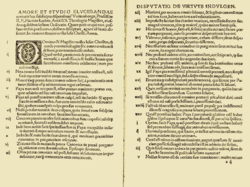Magisterial Reformation
| Part of a series on |
| Reformation |
|---|
 Ninety-five Theses |
Precursors
|
Beginning
|
Contributing factors
|
Theologies of seminal figures
|
Protestant Reformers
|
Major political leaders
|
By location
|
Political and religious conflicts
|
Opposition
|
Conclusion
|
Commemoration
|
Protestantism |
The Magisterial Reformation is a phrase that "draws attention to the manner in which the Lutheran and Calvinist reformers related to secular authorities, such as princes, magistrates, or city councils", i.e. "the magistracy".[1] While the Radical Reformation rejected any secular authority over the Church,[2] the Magisterial Reformation argued for the interdependence of the church and secular authorities, i.e. "The magistrate had a right to authority within the church, just as the church could rely on the authority of the magistrate to enforce discipline, suppress heresy, or maintain order."[1]
In addition, the term magister relates to the emphasis on authoritative teachers. Often this is seen in the names of theological schools descending from magisterial reformers (e.g. Lutheran, Calvinist, and Zwinglian).[3]
References
^ ab McGrath, Alister (1998), Historical Theology, Oxford: Blackwell Publishers, p. 159, ISBN 0-63120843-7.mw-parser-output cite.citation{font-style:inherit}.mw-parser-output q{quotes:"""""""'""'"}.mw-parser-output code.cs1-code{color:inherit;background:inherit;border:inherit;padding:inherit}.mw-parser-output .cs1-lock-free a{background:url("//upload.wikimedia.org/wikipedia/commons/thumb/6/65/Lock-green.svg/9px-Lock-green.svg.png")no-repeat;background-position:right .1em center}.mw-parser-output .cs1-lock-limited a,.mw-parser-output .cs1-lock-registration a{background:url("//upload.wikimedia.org/wikipedia/commons/thumb/d/d6/Lock-gray-alt-2.svg/9px-Lock-gray-alt-2.svg.png")no-repeat;background-position:right .1em center}.mw-parser-output .cs1-lock-subscription a{background:url("//upload.wikimedia.org/wikipedia/commons/thumb/a/aa/Lock-red-alt-2.svg/9px-Lock-red-alt-2.svg.png")no-repeat;background-position:right .1em center}.mw-parser-output .cs1-subscription,.mw-parser-output .cs1-registration{color:#555}.mw-parser-output .cs1-subscription span,.mw-parser-output .cs1-registration span{border-bottom:1px dotted;cursor:help}.mw-parser-output .cs1-hidden-error{display:none;font-size:100%}.mw-parser-output .cs1-visible-error{font-size:100%}.mw-parser-output .cs1-subscription,.mw-parser-output .cs1-registration,.mw-parser-output .cs1-format{font-size:95%}.mw-parser-output .cs1-kern-left,.mw-parser-output .cs1-kern-wl-left{padding-left:0.2em}.mw-parser-output .cs1-kern-right,.mw-parser-output .cs1-kern-wl-right{padding-right:0.2em}
^ Saint-Clair, Geoffrey (2001), "Who's Who in the Reformation", The Radical Reformation, Catholic education, retrieved 2012-11-17
^ Gstohl, Mark (2004), "The Magisterial Reformation", Movements, Xula, retrieved 2012-11-17
This Christianity-related article is a stub. You can help Wikipedia by expanding it. |